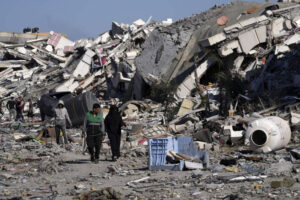
The National Interest Foundation Newsletter
Issue 217, December 1, 2023
Welcome to our NIF Newsletter. In this week’s analysis: we delve into the implications of a temporary ceasefire, examine the growing number of hate crimes in the United States against Arab, Muslim, Palestinian, and Jewish people, and look into the increasing risk of the war between Israel and Hamas escalating into a larger conflict.
Temporary Ceasefire in Gaza

Many Gazans returned to survey what was left of their homes during the truce. (Photo from AP)
The Implications of a Temporary Ceasefire in Gaza
By Jacob Van Veldhuizen
Posted in NIF Newsletter, Press Releases and Newsletters
